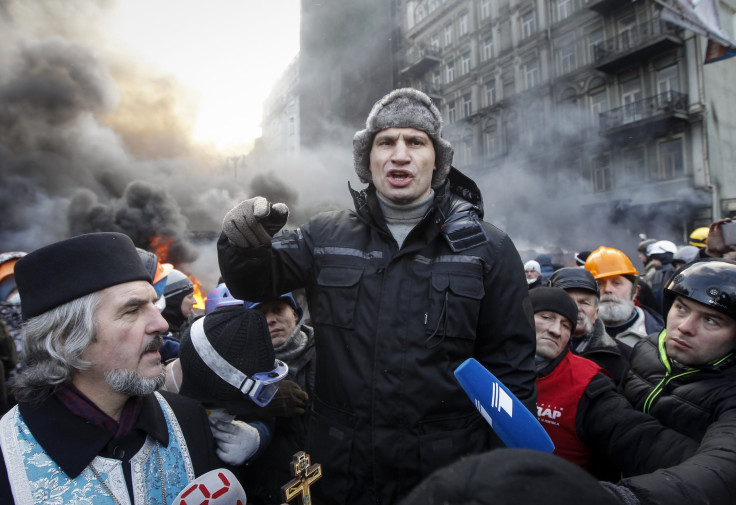Who Is Vitaly Klitschko? The Boxer-Turned-Politician And Face Of The Ukrainian Opposition

As protests in the Ukraine become increasingly violent, Vitaly Klitschko, a former heavyweight boxing champion and a current member of parliament, has emerged as the political face of the Ukrainian opposition. But who is the energetic and charismatic leader?
Klitschko is the leader of the Ukrainian Democratic Alliance for Reforms (UDAR) of Vitaly Klitschko, a largely progressive party that wants Ukraine to become a “successful European state.” Among its goals are to center politics around “fundamental European values,” like Rule of Law, a competitive democracy and a Social Contract Constitution. UDAR holds a 9.5 percent share of the Ukrainian parliament.
UDAR, which is actually an acronym for the Ukrainian word for “punch,” formed in 2010 to support Klitschko’s growing political ambitions. He’s gone from a Kiev City Council member to his faction’s leader in the Ukrainian Parliament in four years between 2008 and 2012, and late last year he announced that he plans to run for president in 2015.
Klitschko is far from just a “celebrity” politician. He was awarded the title “Hero of Ukraine” in 2004 for his achievements as a boxer and he holds a Ph.D. in sports science. He's the only heavyweight champion ever to hold a doctorate degree. That earned him the nickname “Dr. Ironfist.”
He’s been present at protests since they began back in November, when President Viktor Yanukovich refused to sign a European Union association agreement. And he told the crowd “today they stole our dream, our dream of living in a normal country.”
Since then, Klitschko has unwaveringly put his might behind the protests sweeping the Ukrainian capital both physically and politically, accusing the president and his allies of “stealing” the country. As protests turned violent in the wake of sweeping legislation that limited the legal limits of protests, Klitschko was often seen speaking to the crowd over megaphone, urging them to continue nonviolent action.
Most recently, Klitschko demanded Ukrainian President Viktor Yanukovich dismiss the government, repeal the controversial “anti-protest” legislation and call early elections. Earlier today, after an agreed truce, Yanukovich called an emergency session of parliament to work toward an end to the unrest.
Klitschko emerged from the session with news that an agreement had not been made, and told protesters to ready themselves for a police offensive on the Maidan, or Independence Square, where they have been centered. Although he has urged protesters to remain peaceful so far, he told them to not let police drive them out of the Maidan, or Independence Square, and talked of “taking bullets,” and vowed to “go on the offensive” if Yanukovich didn’t respond to his demands. The declaration drew a roar of support.
© Copyright IBTimes 2025. All rights reserved.






















